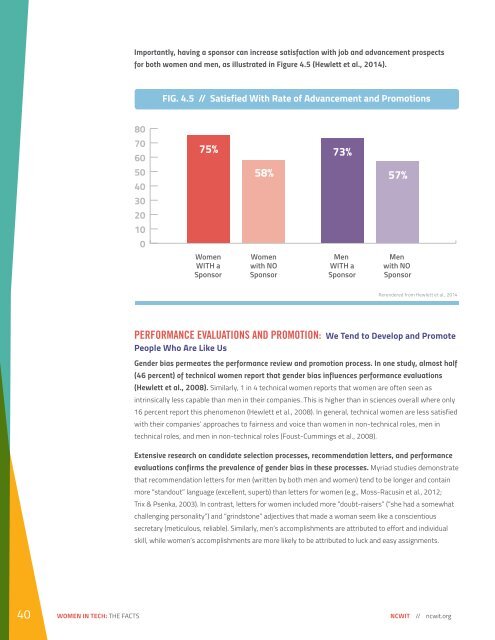WOMEN IN TECH THE FACTS
womenintech_facts_fullreport_05132016
womenintech_facts_fullreport_05132016
Create successful ePaper yourself
Turn your PDF publications into a flip-book with our unique Google optimized e-Paper software.
Importantly, having a sponsor can increase satisfaction with job and advancement prospects<br />
for both women and men, as illustrated in Figure 4.5 (Hewlett et al., 2014).<br />
FIG. 4.5 // Satisfied With Rate of Advancement and Promotions<br />
80<br />
70<br />
60<br />
75%<br />
73%<br />
50<br />
40<br />
58%<br />
57%<br />
30<br />
20<br />
10<br />
0<br />
Women<br />
WITH a<br />
Sponsor<br />
Women<br />
with NO<br />
Sponsor<br />
Men<br />
WITH a<br />
Sponsor<br />
Men<br />
with NO<br />
Sponsor<br />
Rerendered from Hewlett et al., 2014<br />
PERFORMANCE EVALUATIONS AND PROMOTION: We Tend to Develop and Promote<br />
People Who Are Like Us<br />
Gender bias permeates the performance review and promotion process. In one study, almost half<br />
(46 percent) of technical women report that gender bias influences performance evaluations<br />
(Hewlett et al., 2008). Similarly, 1 in 4 technical women reports that women are often seen as<br />
intrinsically less capable than men in their companies. This is higher than in sciences overall where only<br />
16 percent report this phenomenon (Hewlett et al., 2008). In general, technical women are less satisfied<br />
with their companies’ approaches to fairness and voice than women in non-technical roles, men in<br />
technical roles, and men in non-technical roles (Foust-Cummings et al., 2008).<br />
Extensive research on candidate selection processes, recommendation letters, and performance<br />
evaluations confirms the prevalence of gender bias in these processes. Myriad studies demonstrate<br />
that recommendation letters for men (written by both men and women) tend to be longer and contain<br />
more “standout” language (excellent, superb) than letters for women (e.g., Moss-Racusin et al., 2012;<br />
Trix & Psenka, 2003). In contrast, letters for women included more “doubt-raisers” (“she had a somewhat<br />
challenging personality”) and “grindstone” adjectives that made a woman seem like a conscientious<br />
secretary (meticulous, reliable). Similarly, men’s accomplishments are attributed to effort and individual<br />
skill, while women’s accomplishments are more likely to be attributed to luck and easy assignments.<br />
40 <strong>WOMEN</strong> <strong>IN</strong> <strong>TECH</strong>: <strong>THE</strong> <strong>FACTS</strong> NCWIT // ncwit.org


